the human context of business law
advertisement
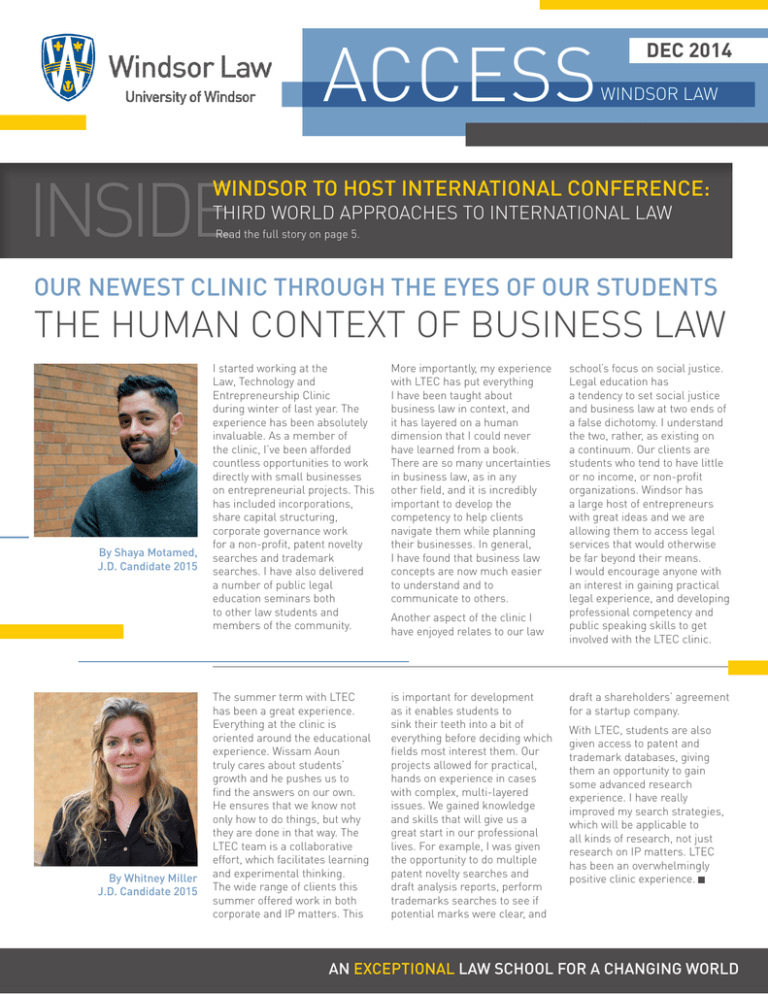
ACCESS DEC 2014 WINDSOR LAW INSIDE WINDSOR TO HOST INTERNATIONAL CONFERENCE: THIRD WORLD APPROACHES TO INTERNATIONAL LAW Read the full story on page 5. OUR NEWEST CLINIC THROUGH THE EYES OF OUR STUDENTS THE HUMAN CONTEXT OF BUSINESS LAW By Shaya Motamed, J.D. Candidate 2015 By Whitney Miller J.D. Candidate 2015 I started working at the Law, Technology and Entrepreneurship Clinic during winter of last year. The experience has been absolutely invaluable. As a member of the clinic, I’ve been afforded countless opportunities to work directly with small businesses on entrepreneurial projects. This has included incorporations, share capital structuring, corporate governance work for a non-profit, patent novelty searches and trademark searches. I have also delivered a number of public legal education seminars both to other law students and members of the community. More importantly, my experience with LTEC has put everything I have been taught about business law in context, and it has layered on a human dimension that I could never have learned from a book. There are so many uncertainties in business law, as in any other field, and it is incredibly important to develop the competency to help clients navigate them while planning their businesses. In general, I have found that business law concepts are now much easier to understand and to communicate to others. The summer term with LTEC has been a great experience. Everything at the clinic is oriented around the educational experience. Wissam Aoun truly cares about students’ growth and he pushes us to find the answers on our own. He ensures that we know not only how to do things, but why they are done in that way. The LTEC team is a collaborative effort, which facilitates learning and experimental thinking. The wide range of clients this summer offered work in both corporate and IP matters. This is important for development as it enables students to sink their teeth into a bit of everything before deciding which fields most interest them. Our projects allowed for practical, hands on experience in cases with complex, multi-layered issues. We gained knowledge and skills that will give us a great start in our professional lives. For example, I was given the opportunity to do multiple patent novelty searches and draft analysis reports, perform trademarks searches to see if potential marks were clear, and Another aspect of the clinic I have enjoyed relates to our law school’s focus on social justice. Legal education has a tendency to set social justice and business law at two ends of a false dichotomy. I understand the two, rather, as existing on a continuum. Our clients are students who tend to have little or no income, or non-profit organizations. Windsor has a large host of entrepreneurs with great ideas and we are allowing them to access legal services that would otherwise be far beyond their means. I would encourage anyone with an interest in gaining practical legal experience, and developing professional competency and public speaking skills to get involved with the LTEC clinic. draft a shareholders’ agreement for a startup company. With LTEC, students are also given access to patent and trademark databases, giving them an opportunity to gain some advanced research experience. I have really improved my search strategies, which will be applicable to all kinds of research, not just research on IP matters. LTEC has been an overwhelmingly positive clinic experience. AN EXCEPTIONAL LAW SCHOOL FOR A CHANGING WORLD ADAM VASEY RECEIVES LAW FOUNDATION OF ONTARIO FELLOWSHIP Pathway to Potential is fighting poverty while strengthening Windsor I am truly honoured to be a recipient of the Law Foundation of Ontario’s (LFO) Community Leadership in Justice Fellowship. Through this program, the LFO has supported many community leaders to pursue innovative, justice-oriented projects that bridge community and academia. I am humbled to be joining that list. I also want to extend my sincere gratitude to Windsor Law’s Dean Cameron and Associate Dean Bhadi for their deep commitment to this project. I also want to thank the LFO for their leadership and insight in making these fellowships available. As a proud graduate of Windsor Law and the School of Social Work at the University of Windsor, it is exciting to be back on campus – in a part-time capacity – for the fall and winter terms. While I thoroughly enjoy the fast-paced nature of my work as director of Pathway to Potential (P2P), there is something exhilarating about the rush of creative energy and feeling of renewal that the start of a fall semester brings. These are exciting times at Windsor Law. Just this past summer, Windsor Law and Pathway to Potential completed the first phase of the Poverty and Social Policy Externship Pilot, which was supported through a University of Windsor Strategic Priority JILLIAN ROGIN ‘08 Fund grant. The Pilot came together through the collaboration and vision of Windsor Law’s Associate Dean Bhadi and Professors Mummé, Smit, Smyth and Tawfik. It allowed P2P to hire four Windsor Law students over the summer to engage in local anti-poverty efforts, and all four students will continue their work for course credit in the fall term. The LFO Fellowship will support research into the development of a unique social justice externship model that can complement the existing clinical programs for which Windsor Law is highly regarded. The research will be undertaken in the spirit of true community-university partnership; it will focus on creating experiential learning opportunities that This is a unique opportunity to draw on, and deepen, my academic and work experience in both law and social work. It will not only allow me to explore how social work principles and practices can be used to inform lawyers’ responses to poverty and other social justice issues, but also to build capacity and connections within and across Windsor Law, the School of Social Work and a wide network of community organizations. If you are interested in connecting about this project, I would love to hear from you! I can be reached at avasey@uwindsor.ca or 519-253-3000 ext. 3968. TAKES ON NEW ROLE AS CLA REVIEW COUNSEL I attended law school with the intention of working towards systemic change within the Canadian legal system for marginalized people and I believe law school clinics have the potential to be catalysts for change. After accepting the position as review counsel at Community Legal Aid and moving to Windsor from Toronto in June of 2014, I realized that I was ‘coming home’ in more ways than one. I was born and raised in Windsor and still have lots of family and friends here, I am an alumna of Windsor Law, 2 are equally beneficial to students and community organizations. and I was a CLA student volunteer in all three years of law school. I am thrilled to be working at CLA and am honoured to be learning so much from colleagues, students, and most importantly, from the clients we serve. What an absolutely exciting place for me to be; at the forefront of social justice legal work, working with and learning from students, and being immersed in the law school community. In so many ways, I am thrilled to be home! MEET OUR NEWEST FACULTY Professor Sara Wharton Professor Sara Wharton completed her Ph.D. at the University of Cambridge and has joined the University of Windsor most recently from the National University of Singapore where she was a postdoctoral fellow. In 2013, she was awarded an Endeavour Research Fellowship from the Government of Australia which she held as a Visiting Fellow at the University of New South Wales Faculty of Law in Sydney, Australia. Professor Wharton is teaching Criminal Law and Access to Justice in the first year law curriculum this year. Her research is in the field of international criminal law and transnational criminal law and she is also interested in public international law, international humanitarian law, and Canadian criminal law. She has welcomed the opportunity to study, research, and work in international law in seven countries on four different continents including Canada, the United States, Denmark, the United Kingdom, the Netherlands, Australia, and Singapore. This has also enabled her to enjoy three of her passions, travelling, learning about different regions of the world, and trying new foods. However, she is excited to return back home to Canada and to join the Law Faculty at the University of Windsor. Professor Pascale Chapdelaine Professor Pascale Chapdelaine’s current research looks at the intersection between copyright, property and contracts, and at various aspects of copyright users’ rights. Her research interests expand to broader consumer protection issues, as they relate to new technologies and new business offerings. She teaches contracts, intellectual property, and consumer law. After practising law for more than fourteen years in corporate, commercial and intellectual property law at the Montrealbased law firm Lavery de Billy, and then as corporate counsel at Bell Canada and BCE Inc., what drew her to academia is her love for learning, researching, and contributing to ongoing debates about pressing legal issues. Interacting with students in and outside the classroom, pushing their thinking, supporting them in their academic endeavours, is a constant source of inspiration that gives her great pride in her work. Professor Chapdelaine volunteered for many years on the parent council of the school of her children, always with a particular attention for the children who were left behind. She looks forward to being actively involved in the community life of the University and City of Windsor. In her free time, she enjoys hiking, cycling, and cross-country skiing with her family and friends. She has a passion for history, food and travelling, and is fluent in French, English and Dutch. Professor Noel Semple Professor Noel Semple is delighted to join Windsor Law, where he is teaching Access to Justice and Civil Procedure. In addition to those two fields, his research interests include legal ethics and professionalism as well as family law. He received his J.D. degree from the University of Toronto Faculty of Law, and his LL.M and Ph.D from Osgoode Hall Law School. 3 Windsor Law’s focus on access to justice makes it an excellent fit for Noel. He enjoyed mentoring first year students in the Professional Identity and Legal Skills intensive week, and is looking forward to continuing his collaboration with Professor Julie Macfarlane’s National SelfRepresented Litigants Research Project. Noel’s wife Angelique Moss practises law at Devries Litigation LLP, an estate litigation boutique firm. They are proud parents of six-year-old Madeleine and two-year-old Malcolm. Noel’s interests include running and cycling, often along Windsor’s spectacular Riverside Trail. Roy McMurtry’s Memoirs and Reflections is on his bedside table. Bojack Horseman and the BBC’s Sherlock are at the top of his Netflix recent activity screen. AN EXCEPTIONAL LAW SCHOOL FOR A CHANGING WORLD FACULTY NEWS AND ACCOLADES CONKLIN JOINS FELLOWSHIP OF ROYAL SOCIETY OF CANADA RECENT RETIREMENTS Professor Bill Conklin has been elected to the Fellowship of the Royal Society of Canada. We would like to acknowledge the retirement of the following faculty members and wish them the very best in their next adventures! Every year, distinguished scholars and artists are elected to the Fellowship of the Royal Society of Canada on the basis of their exceptional contributions to Canadian intellectual life. Professor Conklin was elected as a Fellow by his peers in the Social Sciences Division of the Academy of Social Sciences. Julio Menezes Leigh West Chris Wydrzynski Emily Carasco Professor Conklin’s Fellowship is a great honour for him, and also for Windsor Law School and the University of Windsor. It is a testament to his outstanding scholarship and his standing as an academic. We are all very proud of him and of his accomplishments. SEMPLE WINS OBA FOUNDATION RESEARCH FELLOWSHIP Accessible Professionalism for Tomorrow’s Lawyers or confronting non-state parties such as insurance companies and ex-spouses? What impediments do these private law “personal plight” lawyers encounter in their efforts to provide services to people of modest means? Is there anything that the legal profession and its regulators can do to increase the accessibility of this segment of the bar? Lawyers in private practice offer an essential portal between people with legal problems and the just resolutions which law promises. How, and to what extent, do lawyers create access to justice for individuals negotiating with 4 These research questions animate Accessible Professionalism, a research project being launched by Prof. Noel Semple. The project continues his recent research focus on access to justice and the legal profession. In Personal Plight Legal Practice and Tomorrow’s Lawyers (forthcoming in the Journal of the Legal Profession), he argues that lawyers who provide litigation and dispute resolution Moira McCarney services for individuals will be largely sheltered from the computerization and off-shoring threats which are threatening other legal careers in North America. Semple has also written a monograph, which will be published by Edward Elgar Press in spring, 2015. Legal Services Regulation at the Crossroads: Justitia’s Legions is both a comparative study of legal services regulation in the common law world, and an agenda for regulatory reform. The relationship between regulation and access to justice is a major theme of the book, and one that is particularly relevant in Ontario given the ongoing debates about the paralegal scope of practice and alternative business structures for law firms. VALARIE WABOOSE Valarie graduated from Windsor in 1993 and was called to the Bar in 1995. She practiced law within her community of Walpole Island First Nation for five years as In-House Legal Counsel. While working full-time she completed an LL.M. in Alternative Dispute Resolution (1999) at Osgoode Hall Law School and obtained certification as a Life Skills Coach. In 2002 she completed the Program on Negotiation at Harvard University. She then established a consulting business specializing in policy development, strategic planning, program planning and evaluation, pre-employment training and life skills coaching. She is presently completing her PhD at Trent University. Her APPOINTED RON IANNI SCHOLAR-IN-RESIDENCE doctoral thesis examines the compensation processes utilized by residential school survivors. As a member of the Three Fires Midewiwin Society, Valarie’s teaching philosophy includes introducing both Aboriginal and non-Aboriginal students to Anishinabe (Ojibway) culture and traditions. She believes that non-Aboriginal students need to learn the basic tenets of an Aboriginal worldview before they can represent Aboriginal clients effectively. Valarie’s appointment as Ron Ianni Scholar-in-Residence includes coaching the Aboriginal Moot team, recruiting Aboriginal students, coordinating a speaker’s series and reviewing the services that Windsor Law clinics provide to Aboriginal people. She will also offer courses in indigenous law and legal traditions. Valarie loves the work that she has undertaken. She believes that to attract more Aboriginal students into the law program, it is essential to offer Aboriginal courses and culturally appropriate programming and services for students of Aboriginal ancestry. As a proud alumnus of Windsor Law, she feels that her experience, her familiarity with the Windsor-Essex area,her work ethic and dedication can help the law program to achieve its Aboriginal recruiting and programming goals. WINDSOR TO HOST INTERNATIONAL CONFERENCE Third World Approaches to International Law York University), Usha Natarajan (American University in Cairo) and John Reynolds (National University of Ireland-Maynooth). The first ever TWAIL conference in the global South will be held in Cairo in February 2015. This conference will be followed by two workshops at the University of Windsor (June 2015) and the National University of Ireland, Maynooth (September 2015). The conference is co-organised by Professors Sujith Xavier (University of Windsor, Faculty of Law), Amar Bhatia (Osgoode Hall Law School, 5 The TWAIL Cairo conference and workshops arise from a worldwide network of established and emerging scholars, practitioners, and graduate students of international law and relations engaged with the evolving and complex relationships between the global North (e.g. Western Europe, North America, Australia) and the global South (e.g. Latin America, Asia, and Africa). This fast-growing network continues to meet regularly, with the goals of researching the mutual constitution of international law with colonialism and assessing the prospects for reforming international law pedagogy, scholarship, and practice. The TWAIL Cairo conference call for papers garnered tremendous interest from international law and other disciplines, with over 150 paper submissions by eminent academics, junior scholars, and graduate students from 33 countries. The Cairo conference will connect the existing TWAIL network, largely based in the global North, with like-minded scholars and practitioners in the global South. To this end, this will be the first TWAIL conference to be held in the global South. The TWAIL network has strong ties to Canada, with senior Canadabased academics being amongst the founders of TWAIL, and a growing number of young scholars at Canadian institutions playing important roles in TWAIL’s recent evolution. The conference organizers have raised approximately $25,000 from various institutional sources, including a grant from Harvard Law School’s Institute for Global Law and Policy. They have also been successful, in a very competitive process, in securing a $25,000 Insight Grant from the Social Sciences and Humanities Research Council (SSHRC). Windsor Law congratulates Professor Xavier and his co-organisers for their SSHRC success and looks forward to welcoming the TWAIL scholars and practitioners to Windsor for the conference workshop in June 2015. AN EXCEPTIONAL LAW SCHOOL FOR A CHANGING WORLD THE BYSTANDER INITIATIVE COMES TO WINDSOR LAW O P F Starting in September 2014, Windsor Law is offering workshops to inform students about the role they can play in preventing sexual violence on and off campus. In doing so, we became one of the first law schools in the country to train our students in sexual violence prevention techniques. The initiative is funded by the University of Windsor’s Strategic Priority Fund and is a collaboration of the Law, Arts and Business faculties. At the heart of the Bystander Initiative is the idea that bystanders have the potential to prevent sexual assault. More often than not, when sexual violence occurs a bystander was present who could have prevented it or interrupted it while it was happening. During three-hour workshops, known as Bringing in the Bystander, law students become more aware of sexual violence that occurs around them which may have previously gone unnoticed. Students learn effective strategies to intervene effectively. The Bystander Initiative has been developed around a model of peer education. Many of the students who participate in these workshops will be peer educators in the future. MAKE AN ANNUAL GIFT uwindsor.ca/donate MADAM JUSTICE MARY JO NOLAN HONOURED WITH AWARD IN FAMILY LAW Jo Nolan Award in Family Law was created to recognize her retirement from the Ontario Superior Court of Justice in July 2014. The Honourable Madam Justice Mary Jo Nolan ’81 was honoured by her friends, colleagues and family with a new Windsor Law School award. The Madam Justice Mary 6 Madam Justice Nolan was called to the Bar in 1983 and after a period in private practice took up a position in the Ministry of Community and Social Services working on children’s Legislation. In 1990, she moved to Courts Administration in the Attorney General’s Department. In 1995, she was appointed Regional Counsel for the Southwest Region in the office of the Public Guardian and Trustee and in 1997 she was appointed Case Management Master in Windsor. She was appointed as a Justice of the Superior Court for Ontario in April 2005. She was the first female case management Master in Ontario and the first female Superior Court Justice in Windsor. Madam Justice Nolan was honoured in 2012 with the University of Windsor Clark Award for University and Community Service for her devotion and dedication to the University of Windsor and its Faculty of Law. She has been a sessional lecturer, has served on two Dean Search Committees as the Alumni representative, has also been a member of the Advisory Board of the Canadian and American Dual JD Program, and served as a Justice for the Zuber Moot Competition finals in November 2014. Windsor Law is pleased to honour Mary Jo with this award and we look forward to her continued contributions to the life of Windsor Law School and the University of Windsor. AN EXCEPTIONAL LAW SCHOOL FOR A CHANGING WORLD
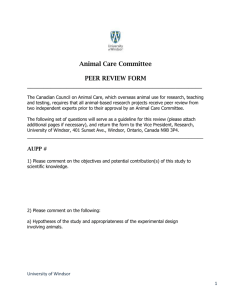
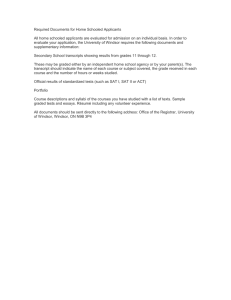
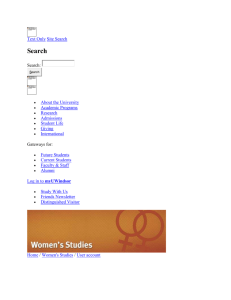

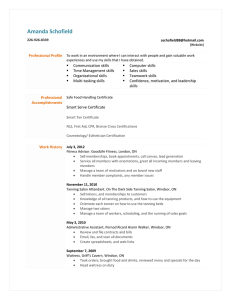
![SAMPLE REQUEST FOR PERMISSION TO USE COPYRIGHTED MATERIAL [Date]](http://s2.studylib.net/store/data/017971214_1-bb8aac04bccba74507aae193fad571c3-300x300.png)